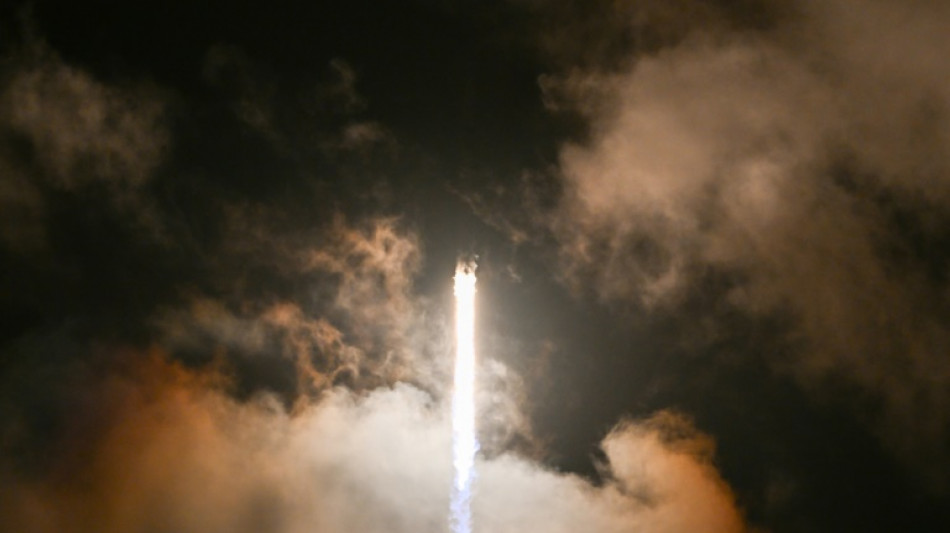
-
 Vietnam AI law takes effect, first in Southeast Asia
Vietnam AI law takes effect, first in Southeast Asia
-
Brazil's Lula visits flood zone as death toll from landslides hits 70

-
 New Zealand into T20 World Cup semis as Sri Lanka avoid big Pakistan loss
New Zealand into T20 World Cup semis as Sri Lanka avoid big Pakistan loss
-
Medvedev wins Dubai title as Griekspoor withdraws

-
 First Yamal hat-trick helps Liga leaders Barcelona beat Villarreal
First Yamal hat-trick helps Liga leaders Barcelona beat Villarreal
-
Liverpool hit five past West Ham, Haaland-less City face Leeds test

-
 Van der Poel romps to cobbled classic win
Van der Poel romps to cobbled classic win
-
Republicans back Trump, Democrats attack 'illegal' Iran war

-
 Madonna is surprise attraction at Dolce & Gabbana Milan show
Madonna is surprise attraction at Dolce & Gabbana Milan show
-
Farhan keeps Pakistan hopes alive as they post 212-8 against Sri Lanka

-
 Afghanistan says civilians killed in Pakistan air strikes
Afghanistan says civilians killed in Pakistan air strikes
-
Tug of war: how US presidents battle Congress for military powers

-
 Residents flee as Iran missiles stun peaceful Gulf cities
Residents flee as Iran missiles stun peaceful Gulf cities
-
Streets empty and shops close as US strikes confirm Iranian fears

-
 Israelis shelter underground as Iran fires missiles
Israelis shelter underground as Iran fires missiles
-
Bournemouth held by Sunderland in blow to European bid

-
 VAR expanded to include second bookings and corners for World Cup
VAR expanded to include second bookings and corners for World Cup
-
Iranians in Istanbul jittery but jubilant at US, Israeli strikes

-
 Congo-Brazzaville president vows to keep power as campaign kicks off
Congo-Brazzaville president vows to keep power as campaign kicks off
-
US, Israel launch strikes on Iran, Tehran hits back across region

-
 Germany's Aicher wins women's super-G in Soldeu
Germany's Aicher wins women's super-G in Soldeu
-
Fight against terror: Trump threatens Tehran's mullahs

-
 US and Israel launch strikes on Iran, explosions reported across region
US and Israel launch strikes on Iran, explosions reported across region
-
Iran's Khamenei: ruthless revolutionary at apex of Islamic republic

-
 In Iran attack, Trump seeks what he foreswore -- regime change
In Iran attack, Trump seeks what he foreswore -- regime change
-
Climate change forces facelift for Michelangelo masterpiece

-
 Trump says US aims to destroy Iran's military, topple government
Trump says US aims to destroy Iran's military, topple government
-
Acosta wins season-opening MotoGP sprint after Marquez penalty

-
 US and Israel launch strikes against Iran
US and Israel launch strikes against Iran
-
Afghanistan says Pakistan fighter jet down as cross-border strikes flare

-
 Kerr says only '85 percent' fit for Women's Asian Cup
Kerr says only '85 percent' fit for Women's Asian Cup
-
Messi's Inter Miami to visit White House: US media

-
 Thunder beat Nuggets in overtime on Gilgeous-Alexander's return
Thunder beat Nuggets in overtime on Gilgeous-Alexander's return
-
'It's surreal': Zimbabwe superfans revel in unexpected ride to India

-
 New 'Wuthering Heights' film unleashes fresh wave of Bronte-mania
New 'Wuthering Heights' film unleashes fresh wave of Bronte-mania
-
US backs Pakistan's 'right to defend itself' after strikes on Afghanistan

-
 Bezzecchi beats Marquez to pole at season-opening Thailand MotoGP
Bezzecchi beats Marquez to pole at season-opening Thailand MotoGP
-
OpenAI strikes Pentagon deal with 'safeguards' as Trump dumps Anthropic

-
 Oscar-nominated 'F1' sound engineers recreate roar of racetrack
Oscar-nominated 'F1' sound engineers recreate roar of racetrack
-
15 dead as cash-packed military plane crashes in Bolivia

-
 Costa Rica's Grynspan pledges reform in bid for UN chief job
Costa Rica's Grynspan pledges reform in bid for UN chief job
-
Former All Black Bridge hailed for influence at Western Force

-
 'Sinners' vampires inspired by animals, says Oscar hopeful makeup artist
'Sinners' vampires inspired by animals, says Oscar hopeful makeup artist
-
For Oscar nominee Stellan Skarsgard, good cinema is like slow food

-
 'Brilliant industry' sees Reds down Highlanders in Super Rugby
'Brilliant industry' sees Reds down Highlanders in Super Rugby
-
Neil Sedaka, US singer and songwriter, dies age 86

-
 New to The Street to Broadcast Executive Leadership Interviews Featuring Medicus Pharma Ltd. (NASDAQ:MDCX), CitroTech (NYSE:CITR), Vivos Therapeutics, Inc. (NASDAQ:VVOS), and Virtuix Holdings ($VTIX) on Bloomberg Television Tonight at 6:30 PM EST
New to The Street to Broadcast Executive Leadership Interviews Featuring Medicus Pharma Ltd. (NASDAQ:MDCX), CitroTech (NYSE:CITR), Vivos Therapeutics, Inc. (NASDAQ:VVOS), and Virtuix Holdings ($VTIX) on Bloomberg Television Tonight at 6:30 PM EST
-
Understanding Common Dental Issues That Develop Over Time in Richardson, TX

-
 Building Smarter: How Proptech Is Reshaping Canadian Real Estate Development
Building Smarter: How Proptech Is Reshaping Canadian Real Estate Development
-
MEWA Launches the First Saudi Water Week Next April to Shape the Future of the Water Sector Regionally and Globally


Private astronauts on daring trek ahead of historic spacewalk
A private crew set out on an audacious orbital expedition Tuesday, journeying deeper into the cosmos than any humans in half a century as they prepare for the first ever spacewalk by non-professional astronauts.
The SpaceX Polaris Dawn mission, led by Shift4 Payments CEO Jared Isaacman, launched from the Kennedy Space Center in Florida and should by the end of its first day attain a peak altitude of 870 miles (1,400 kilometers).
That is nearly three times farther from Earth than the International Space Station, as their Crew Dragon spaceship navigates through portions of hazardous, high-radiation Van Allen belt during its roughly five-day trek.
And radiation isn't the only challenge the four-member team faces.
"Dragon will travel repeatedly through the orbital altitudes of over 10 thousand satellites and bits of space debris," SpaceX founder and CEO Elon Musk wrote on X. "No room for error in our calculations."
The highlight of the voyage is slated for as early as Thursday: the first ever spacewalk by civilians, outfitted in sleek, newly developed SpaceX extravehicular activity (EVA) suits with heads-up displays, helmet cameras and advanced joint mobility systems.
SpaceX has scheduled the EVA for 0623 GMT on Thursday, with a backup window on Friday at the same time.
Since the Crew Dragon capsule lacks an airlock, the entire crew will be exposed to the vacuum of space for around two hours, as two crewmates venture out, in turn, for 15 to 20 minutes each.
- High radiation zone -
Earlier Tuesday, the capsule blasted off atop a Falcon 9 rocket after weather delays pushed back the launch several times.
Applause broke out across the mission control center as it separated successfully from the main engine and the first glimpses of Earth came into view.
As they prepare for their spacewalk, the crew have been tasked with gathering data on decompression sickness and the health effects of the Van Allen radiation belt, a region teeming with high-energy charged particles.
While venturing deep into space, the crew won’t exceed the distances reached during the Apollo missions to the Moon from 1968 to 1972.
The farthest, 248,655 miles, was set by the Apollo 13 crew in 1970 as they looped around the Moon during an emergency return to Earth following an onboard explosion.
- Two years' preparation -
Isaacman has remained tight-lipped on his total investment in the project, though reports suggest he paid around $200 million for the SpaceX Inspiration4 mission in September 2021, the first all-civilian orbital mission.
Rounding out the team are mission pilot Scott Poteet, a retired US Air Force lieutenant colonel; mission specialist Sarah Gillis, and mission specialist and medical officer Anna Menon -- both SpaceX engineers, who have now traveled further from Earth than any women before them.
The quartet underwent more than two years of training in preparation for the landmark mission, logging hundreds of hours on simulators as well as skydiving, centrifuge training, scuba diving, and summiting an Ecuadoran volcano.
Polaris Dawn is the first of three missions under the Polaris program, a collaboration between Isaacman and SpaceX.
The final mission is slated to be the first crewed flight of SpaceX's Starship prototype -- the rocket it envisions as the key to future Mars colonization.
In addition to their spacewalk, the crew will test laser-based satellite communications between the spacecraft and Starlink's satellite constellation, aiming to enhance space communication speeds.
They'll also carry out 36 scientific experiments, including tests on contact lenses with embedded microelectronics to monitor changes in eye pressure and shape -- adding to the growing body of space research aimed at advancing human exploration beyond Earth.
L.Davis--AMWN


